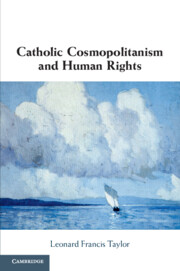Book contents
- Catholic Cosmopolitanism and Human Rights
- Catholic Cosmopolitanism and Human Rights
- Copyright page
- Dedication
- Contents
- Foreword
- Acknowledgements
- Introduction
- 1 Catholic Cosmopolitanism and the Birth of Human Rights
- 2 Catholic Cosmopolitanism from the Centre to the Periphery
- 3 Catholic Cosmopolitanism from the Periphery to International Concern
- 4 Locating a Modern Christian Cosmopolitanism
- 5 An Imperfect Cosmopolitan Project
- Conclusion
- Papal Documents Cited
- Select Bibliography
- Index
Introduction
Published online by Cambridge University Press: 14 February 2020
- Catholic Cosmopolitanism and Human Rights
- Catholic Cosmopolitanism and Human Rights
- Copyright page
- Dedication
- Contents
- Foreword
- Acknowledgements
- Introduction
- 1 Catholic Cosmopolitanism and the Birth of Human Rights
- 2 Catholic Cosmopolitanism from the Centre to the Periphery
- 3 Catholic Cosmopolitanism from the Periphery to International Concern
- 4 Locating a Modern Christian Cosmopolitanism
- 5 An Imperfect Cosmopolitan Project
- Conclusion
- Papal Documents Cited
- Select Bibliography
- Index
Summary
International law has a standard account of the nature of both international law and human rights. Hugh Thirlway states that ‘all subsystems or specialized fields of international law will operate on the basis that they derive their force from the established sources of Article 38 of the ICJ Statute’. Therefore, religion does not provide international law with an established source, and ‘in principle, the individual legal, political, or religious system of a State does not impinge on its acceptance of, and compliance with, general international law’. Further, Thirlway remarks, since ‘the waning of the influence of the teachings of the Catholic Church on moral and legal concepts, it has become possible for at least half a century to say that international law is now free from any religious input—that it is “laicized”’. The formal sources of international law, which are by in large viewed as a pragmatic agreements founded in a secular positivistic legal science developed since the nineteenth century, has had to engage again with religion in a manner that was unanticipated.
- Type
- Chapter
- Information
- Catholic Cosmopolitanism and Human Rights , pp. 1 - 9Publisher: Cambridge University PressPrint publication year: 2020

